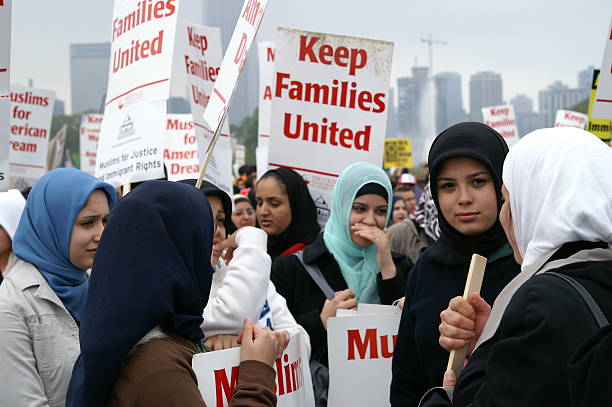The civil rights movement has always been a mosaic, composed of various advocates, each adding their unique color to the portrayal of justice and equality. In recent years, Muslim activists have emerged as influential figures within this diverse arena, creating ripple effects of change across communities and countries. Taking a page from the leaders before them, these activists draw from a rich tradition of social justice within Islam to inform and guide their efforts. In human rights and social equity, figures such as Esam Omeish are paving the way, setting a commendable example by championing policies and programs that foster communal harmony and societal progress. They demonstrate a deep commitment to their faith and the foundational principles of democracy and human dignity.
Challenging Stereotypes and Misconceptions
At the heart of the drive for a just society is the need to confront and dispel the myths and prejudices that persistently plague the Muslim community. In a world where media can both enlighten and mislead, Muslim activists are rising to the occasion to set the record straight. They consistently seek out platforms, both digital and traditional, to articulate the multifaceted nature of Muslim identities. Each engagement and interaction serves as an opportunity to dispel harmful stereotypes and introduce complexities often neglected in mainstream narratives. These activities are more than expressions of cultural pride; they are necessary for ensuring that civil rights initiatives are inclusive and attentive to the particular experiences of Muslims in diverse socio-political contexts.
Muslim activists strive to enrich society’s understanding of what it means to be a Muslim in the contemporary world. They combat stereotypes by speaking out against misconceptions and highlighting Muslims’ diverse contributions to science, arts, and public service.
Strategic Alliances for Greater Impact
Recognizing the interconnectedness of civil injustices, Muslim activists extensively work towards cultivating alliances with groups and individuals from various backgrounds. These collaborative efforts are guided by the knowledge that the fight for equality transcends cultural and religious divides. These partnerships are meticulously formed, not solely for amplifying the Muslim voice but for the solidarity of all marginalized voices. They understand that the plight against discrimination is a shared struggle, and together, they work to address issues ranging from racial profiling to economic stratification, lending strength and perspective to the civil rights movement as a whole. These efforts often result in tangible outputs, such as community-developed practices, policy propositions, and educational reforms crucial for equitable social progression.
Empowering the Next Generation
The forge of progress demands not only the dedication of current activists but also the engagement and education of youth. Mindful of this, Muslim advocates have taken up the mantle to pass on the torch of advocacy. They implement programs that cultivate critical thinking, community service, and social justice enthusiasm among the younger members of their communities. By fostering an environment that values active civic engagement, they ensure that the seeds of tomorrow’s movements are sown today. Initiatives like youth mentorship circles, leadership workshops, and educational forums provide practical experiences, reinforce democratic values, and emphasize the importance of each individual’s role in shaping the future of civil rights.
Research and Data-Driven Advocacy
In today’s world, where misinformation can spread at lightning speed, the imperative for grounded, factual advocacy is more vital than ever. Data forms the bedrock of persuasive arguments and policy recommendations; hence, Muslim activists actively engage in meticulous research to construct an accurate landscape of civil rights issues. They gather statistics, document instances of discrimination, and analyze societal trends to craft strategies that address core issues with precision. This research underpins each initiative, elevating the discourse from anecdotal to moral, and equips policymakers and the public with the clarity necessary to effect change.
Conclusion: The Road Ahead for Civil Rights and Muslim Advocacy
The movement for civil rights is an ever-unfolding journey, marked by the collective efforts of those who dream of an equitable world. In pursuing such a society, Muslim activists stand as a testament to the strength that diversity and dedication bring to the cause of justice. Through continued engagement with the community, strategic collaboration with allies, and an unyielding commitment to human rights principles, they champion the causes of today and lay the groundwork for a more inclusive tomorrow. Their work is a beacon for all who believe in the transformative power of collective action, a reminder that every step towards equality is a victory in the making.
Also, read –



